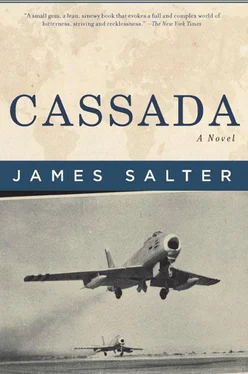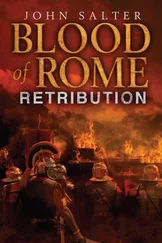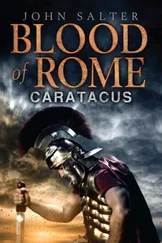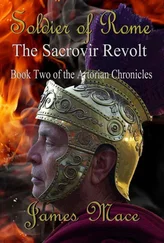Twenty feet farther on there is something pale floating in a small puddle. Godchaux reaches down. The water is deeper than it looks. He pulls up a map, soggy and dripping, a course drawn on it in grease pencil. There are other scraps of paper around, pages from the maintenance forms. At the edge of some woods they come to the end of it. The emblem of disaster, the engine, huge, with dirt packed into it, is at the base of a tree, the trunk marked with a great, white gouge.
They stand, looking over the scene.
“I don’t see the seat anywhere,” Dunning says.
“No.”
It may be elsewhere, part of an ejection.
“We ought to work back.”
“Yes,” the colonel agrees. “Spread out more.”
Feet soaked, they walk through the rain, moving slowly. Ahead are two or three lights jerking from spot to spot on the ground. The sky is invisible, absolutely black. It’s like being in a mine or a deep, underground cave. They stumble over rocks. Then Harlan calls,
“Over here!”
The flashlight glides to something, hard to make out.
“Here’s the cockpit,” Harlan says.
The flashlight stays on it, then other lights as searchers converge. The seat is lying on its side, ripped free. It’s empty. Cadin’s light moves to a section of the instrument panel and picks out the black gauges. Harlan is bending over something a few feet away.
“What is it?”
“Canopy frame,” he says.
They look at the seat again. The safety belt is unbuckled. Dunning tries to calculate what that might mean. The ejection handle hasn’t been raised. The seat wasn’t fired.
“That’s where we found him,” somebody says.
Cadin’s light comes up and holds there. It’s a corpsman, white uniform visible beneath a raincoat. He wears a pair of rubber boots.
“Dead?” Cadin says.
The corpsman nods. “Yes, sir.”
The cold is making them shiver. Rain runs down their faces. Dunning has borrowed a flashlight and goes off by himself, poking his way from piece to piece, making small, slow circles at his feet with the light. He stops and then goes on, aimlessly it seems. He is gathering the catastrophe, wandering in it like a sleepwalker. The wreckage is total. Nothing can recombine it.
“Do you suppose he blacked out or something, Lieutenant?” the corpsman asks Godchaux who lingers behind.
“Do I suppose what?”
“Blacked out. You know.”
“No. He ran out of fuel.”
“Oh,” the corpsman says, nodding. He turns half away. “It really broke up, didn’t it?” He turns back to Godchaux, the beads of water shining on his raincoat and running off. “It doesn’t look like they’ll be putting this one back together again, does it?”
“Sure,” Godchaux says. “They’ll have it flying again inside of a week.”
He walks towards the major, shaking his head.
No sound except for the clock. Beyond the windows the night is fading, smooth from the passage of hours. Exhausted from the same dream over and over, Isbell wakes. His eyes see nothing. It’s silent and cold. He lies in bed aching, too ancient to move. Out there somewhere, more silent still, in the matted grass the wreckages lie, blown apart in the darkness, wet as the ground. They are miles from each other yet they are one. The earth is soft from the rain. The marks of tires in it are blurring, the print of feet. The photographers have yet to come. A mournful stillness covers it all.
He looks toward the windows. It’s close to daybreak. The paleness of dawn. He is writing his statement again, sitting at a desk in base operations, the one survivor, strong but shaken, putting it down while it’s fresh. The pen feels like a stick in his fingers. He writes automatically, as if copying something. What he is writing he doesn’t know. They are walking in and out almost aimlessly, back from the scene. Their shoes are muddy. He can hear the talking plainly. Occasionally he is asked a question. The flight surgeon has gone off to get some sleeping pills though Isbell has said he doesn’t need any. “You might.” Isbell is too tired to argue.
Dunning’s hand is there on his shoulder. The hand is consoling, but it’s impossible to write with it there. After a while Dunning walks away and Isbell resumes, adding one sentence to another. It seems endless. It requires so much time. He is listening, writing, and thinking all at once. The overheard words beat in on him strangely. He’s far off, thinking of different things entirely, drawn into a kind of dream of what it was like six hours, a day, a month before. A time of innocence. He longs for it like a murderer. He yearns for the past. Around him they are discussing it in lowered voices. He knows how long it will go on, turning into testimony, transcripts, findings. The board will meet, the attached documents mount up. That there should begin the long, careful process of determining exactly what caused the accident is right, but it will only reveal the facts. He could almost save them the trouble. He could put it all in a single phrase, but it would be too incomprehensible, too derelict. Somewhere within him there was, there could still be, a flaw. It could never have occurred otherwise.
He sits on the edge of the bed, then stands by the window. The low clouds are still there. He can make them out, smooth as a river. The sky is close to the earth, just beginning to appear. Beneath his naked feet the floor is cold. He stands shivering, alone. The reaction is always delayed, the shaking. His knee hurts. He had somehow twisted it, it feels stiff and unbending.
“What’s wrong?”
Marian’s voice is husky. She is up on one elbow. In the half-light her face is soft and wondering, like a child’s. The dark hair around it is pressed by sleep.
“What are you doing? Are you all right?”
“Nothing. I’m just thinking.”
She takes a deep, sympathetic breath. “Can’t you sleep?”
He wants to embrace her instead of answering, the look of her, the loyalty. At that moment she seems everything in life.
In Puerto Rico, sighing at midnight, they are aware of nothing. Cassada’s mother is sleeping, his cousins and friends. He still exists there, this last night. He shines in their sleep like an exploded star, the son who was killed in Germany in a flying accident, the only son.
“Try and sleep,” Marian murmurs and falls back to the bed, rolling onto her side and hitting at the pillow once or twice to make it right. In a minute she is gone.
He is left thinking. The events of the evening before, as distinct as when they were happening, loom up like a wall and repeat themselves over and over. He tries to change them but they are unalterable. He tries to think of something else. We parted without a word. There were many things he’d intended to say, that he might have said, given time. Now that it is too late he is certain that Cassada bore something unique, something they had missed, the sum of their destinies. It was true Isbell had sometimes opposed him. It had been essential to. It was part of the unfolding.
The clouds are heavy in the dawn. Beneath, the world is in shadow. Above, there is sunlight, unseen. Beyond, the invisible stars. Cassada, too, had been unable to say certain things. He hadn’t the power to. All that was to come.
To die is to sink from the sight of this world,” the chaplain intones, voice filling the quiet. “It is to sink from the sight of this world and to rise again in God.”
The air is stuffy, as if the windows have not been opened in a long time. Isbell and his wife are in the first row, along with the Dunnings. Wickenden sits two rows behind and Harlan a row behind that, next to the aisle, worrying something out of his back teeth with his tongue.
Читать дальше












